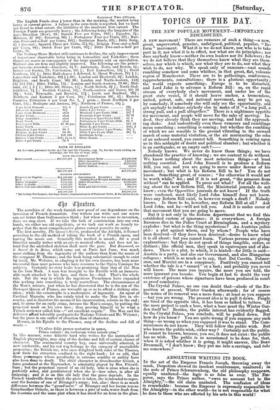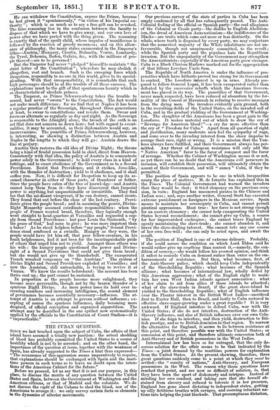ABSOLUTISM WRITING ITS BOOK.
IN the act of the Emperor Francis Joseph, throwing away the mask, Despotism showed its insolent countenance, unaltered; in the note of Prince Schwarzenberg, the old philosophy reappears, equally unaltered—the logic is as false as ever. The Em- peror, says the Prince author, "owes no account but to the Almighty,"—the old claim unabated. The confusion of ideas is remarkable : because the Emperor is supremely responsible to the Almighty—in the other world—he is not responsible for what he does to those who are affected by his acts in this world! He can withdraw the Constitution, argues the Prince, because be had given it "spontaneously," "in virtue of his Imperial au- thority "; which is as much as to say a free gift can be revoked. The false reasoning lies in the confusion between:the faculty to dispose of that which we have to give away, and our own love of power after we have parted with the thing given. The reasoning is exactly, that of the spoilt child, whose impulse of munificence is followed by the reaction of greedy meanness; and on this allow- ance of philosophy, the many states enumerated in the Emperor's titles—Austria,! Hungary, Croatia, Dalmatia, Venice, Lombardy, the' Tyrol, Bohemia, Baden, Galicia, &c., with the millions of peo- ple thereof—are to be governed !
But the "Em eror had never "pledged" himself to maintain "the strict letter of the Constitution"; wherefore he may abolish it altogether, root and branch. Such is the sweeping force which Despotism, responsibly to no one in this world, gives to its special- pleading. With that irresponsibility, it is remarkable that such high personages should be at the trouble of all these excuses. The explanations must be the gift of that spontaneous bounty which is so characteristic of absolute princes.
The Emperor, as Prince Schwarzenberg takes the trouble to record, had never "sworn" to the Constitution. The fact would not make much difference; for we find that at Naples it has been a regular practice ot the Sovereign, throughout three generations at least, to swear to constitutions and revoke them. Swear and forswear alternate as regularly as day and night. As the Sovereign is responsible to the Almighty alone, the breach of the oath is an act that does not concern us down here;' but with regard to event- ualities, it may be actounted, as their diplomatists would say, an inconvenience. The punctilio of Prince Schwarzenberg, however, is interesting, as showing a distinction between Austria and Naples in the lengths to which they will go : Austria draws the line at perjury. Austria then restores the old idea of 'Divine Right ; the throne being a kind of feudal possession held in chief, direct from Heaven. Consistently with that idea, the policy of Austria is to concentrate power solely in the Government; to hold every class in a kind of tutelage, and to exact obedience of the Government as to a Second Providence. Resist that Providence, and it strikes, Jove-like, with the thunder of destruction ; yield to it obedience, and it shall suffice you. Now, it is difficult for Despotism to keep up its as- sumed character in either Of these parts, of thunderer or father. Since the people have eaten oTthe tree of knowledge—and Austria cannot keep them from it—they have discovered that Imperial power is anything but unquestionable or irresistible. They find too that the soi-disant vicegerent, if be can destroy, cannot create. They found that out before the close of the last century. Provi- dence gives the people bread ; and in assuming the power, Divine- Right Monarchy assumed coordinate responsibilities : when the people of France wanted bread, therefore, they logically enough went straight to head-quarters at Versailles and re9.uested a sup- ply from Second Providence : but poor Louis the Sixteenth, "by the grace of God," had none to give ; he was more impotent than a baker ! As he stood helpless before "my people," Second Provi- dence stood confessed as a swindle. Hungry as they were, the people would have let him off, that poor fellow-creature, in his frank helplessness, had it not been for the inextinguishable pride of others that urged him not to yield. Amongst those others was his wife : the hungry people questioned the power and Divine- right of a Second Providence that could not give them bread ; but she would not give up the thunderbolt. The exasperated French wreaked vengeance on "the Austrian." The system of Divine Right and Second Providence exploded at Versailles ; and now the Austrian, still unteachable, is trying to revive it at Vienna. We know the results beforehand : the account has been thrice east up'; the part cannot be. sustained.
In proportion as the people become more enlightened, they become more governable, though not by the brazen thunder of a spurious Right Divine. As mere power loses its hold over in- creasing numbers and increasing intelligence, the second element of governance becomes essentially necessary—influence. The at- tempt of Austria is an attempt to govern without influence; ex- cepting of course the spurious influences, daily becoming more despised, of official corruption and organized superstition. The attempt may be described in the one epithet now systematically applied by the officials to the Constitution of Count Stadion—it is "impracticable."



























 Previous page
Previous page